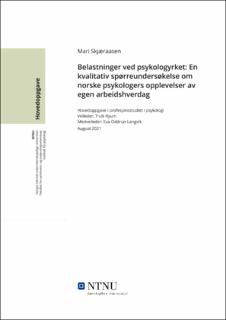| dc.contributor.advisor | Ryum, Truls | |
| dc.contributor.advisor | Langvik, Eva Oddrun | |
| dc.contributor.author | Skjæraasen, Mari | |
| dc.date.accessioned | 2021-10-16T17:22:18Z | |
| dc.date.available | 2021-10-16T17:22:18Z | |
| dc.date.issued | 2021 | |
| dc.identifier | no.ntnu:inspera:75803735:9964957 | |
| dc.identifier.uri | https://hdl.handle.net/11250/2823504 | |
| dc.description.abstract | Psykologer har et komplekst yrke som gjør dem særlige sårbare for arbeidsrelatert stress. Til tross for sammenheng mellom arbeidsrelatert stress og negative utfall for den enkelte psykolog, arbeidsplassen de jobber på og pasientene de møter, finnes det lite publisert forskning på yrkesutfordringer og -stress blant psykologer. Denne studien undersøker derfor norske psykologers opplevelse av egen arbeidshverdag, med spesielt fokus på arbeidsbelastninger og hvordan dette håndteres av den enkelte psykolog. Studien har som formål å sette søkelys på det komplekse samspillet mellom arbeidsbelastninger knyttet til både organisatoriske og individuelle faktorer og måten disse håndteres på, og dermed gi nyansert og ny innsikt til teori og praksis på feltet. Studien er basert på en kvalitativ spørreundersøkelse (n = 67) blant norske psykologer og psykologspesialister, og har en induktiv tilnærming til både innhenting og analyse av datamaterialet. Ved hjelp av NVivo ble deltakernes skriftlige besvarelser kodet og analysert gjennom en manifest og latent kvalitativ innholdsanalyse. Analysen av empirien tyder på at arbeidsbelastningene er sammensatte og har sammenheng med ulike faktorer i og utenfor arbeidshverdagen. Majoriteten av informantene fokuserte på hvordan ugunstige rammebetingelser, kjennetegnet av høy arbeidsmengde kombinert med manglende støtte, kunne få negative konsekvenser for hjelpetilbudet og profesjonell selvivaretakelse. Krevende pasientmøter ble også beskrevet som belastende, spesielt møtet med menneskelig lidelse og ansvarsfølelsen. Når belastningene er store, kan deltakerne oppleve fysiologiske plager, redusert mental kapasitet, redusert emosjonell kapasitet og/eller endring i aktivitetsmønsteret. Dette påvirket informantene både på jobb og privat, sistnevnte i enda større grad. Måten arbeidsrelaterte belastninger håndteres av deltakerne, baserer seg på ressurser og mestringsstrategier som bidrar til en balansert livsstil, samt redusere belastning på enkeltindividet. På arbeidsplassen innebærer det et godt arbeidsmiljø, kontroll, muligheter for faglig utvikling, og opplevelsen av mening. Av selvivaretakelsesstrategier fokuserer deltakerne på det som gir styrke, selvmedfølelse og egenterapi. Fravær eller mangel på ressurser og/eller mestringsstrategier synes å vanskeliggjøre håndtering av yrkets krevende sider, og kan bidra til mistrivsel og oppsigelser. I lys av koronaviruspandemiens innvirkning på arbeidslivet, ble det inkludert spørsmål om dette i undersøkelsen. Deltakerne opplevde praktiske utfordringer, negative konsekvenser for pasientarbeidet, mindre kollegakontakt og nye krav til fleksibilitet i forbindelse med pandemien. Studien omhandler et relativt underutforsket tema, og utvider eksisterende kunnskap om arbeidsrelatert belastning innen psykologyrket og egenskaper ved både individ og arbeidsmiljø som har betydning for god profesjonell fungering. Funnene presentert i studien tyder på at særlig organisatoriske betingelser er viktig for å forstå både belastning og mestring i psykologyrket.
Nøkkelord: arbeidsrelatert belastning, psykolog, kvalitativ spørreundersøkelse | |
| dc.description.abstract | Psychotherapists have a complex occupation which makes them vulnerable to work-related stress. Despite the association between work-related stress and negative outcomes for the individual psychotherapist, the workplace they belong to and the patients they meet, there is limited published research regarding occupational challenges and stress among psychotherapists. The present study examines Norwegian psychotherapists' experience with their own workday, with special focus on work-related strain and how this is managed by the individual psychotherapist. The overarching goal of the study is to highlight the complex interaction between work-related strains, organizational and individual factors and how this is managed, and to give a nuanced and new insight to theory and practice in the field. The study is based on a qualitative questionnaire (n = 67) among Norwegian psychotherapists and specialized psychotherapists, with an inductive approach to data collection and analysis. Using NVivo, the written accounts of the participants were coded and analyzed through a manifest and latent qualitative content analysis. The analysis of the empirical data indicates that work-related strain is a compounded matter related to diverse factors within and outside of the workplace. The majority of the participants focused on adverse workplace conditions, characterized by a heavy workload combined with a lack of support, which could result in negative consequences for the quality of care and professional self-care. The psychotherapists also experienced demanding patient encounters as straining, especially the exposure to human suffering and a sense of responsibility. When the strain is high, the participants can experience physiological symptoms, reduced mental capacities, reduced emotional capacities and/or changes in activity. These changes could affect them at work, but more than that, it could affect them in their private life. The management of work-related strain and challenges in the workplace were based on resources and coping-strategies that contributed to living a balanced life and reduced strain on the individual. A good working environment, control, opportunity for professional development, and sense of meaning are important in the work-context. When it came to self-care-practices the participants focused on self-compassion, activities and practices that provide strength, and personal therapy. The absence or lack of resources and/or coping strategies make it more difficult to cope with occupational challenges and can contribute to dissatisfaction and turnover. Due to the impact that the coronavirus-pandemic had on the worklife, it was natural to include questions about how the pandemic had affected psychotherapists' work. The participants experienced practical challenges, adverse consequences for the patients, reduced contact with colleagues and new demands for flexibility due to the pandemic. The study covers a relatively underexplored subject, and expands current knowledge on work-related strain among psychotherapists, and individual and work-based characteristics with significance for the professional functioning among psychotherapists. The findings presented in the study indicates that organizational factors are especially important for understanding strain and performance in psychotherapists profession.
Keywords: Work-related strain, psychotherapist, qualitative questionnaire | |
| dc.language | nob | |
| dc.publisher | NTNU | |
| dc.title | Belastninger ved psykologyrket: En kvalitativ spørreundersøkelse om norske psykologers opplevelser av egen arbeidshverdag | |
| dc.type | Master thesis | |
